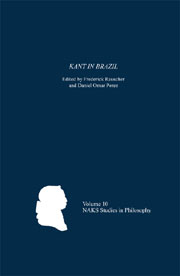Book contents
- Frontmatter
- Contents
- Acknowledgments
- Note on Sources and Abbreviations
- Introduction
- 1 Two Centuries of Kantian Studies in Brazil
- 2 Self-Consciousness and Objective Knowledge in the Transcendental Deduction of the Critique of Pure Reason
- 3 Intuitive Knowledge and De Re Thought
- 4 Predicative Judgments and Existential Judgments: Apropos Kant's Critique of the Cartesian Ontological Argument
- 5 An Experiment with Practical Reason
- 6 On the Faktum of Reason
- 7 Critique, Deduction, and the Fact of Reason
- 8 The Noncircular Deduction of the Categorical Imperative in Groundwork III
- 9 The Distinction between Right and Ethics in Kant's Philosophy
- 10 Right and the Duty to Resist, or Progress toward the Better
- 11 The Fundamental Problem of Kant's Juridical Semantics
- 12 Right, History, and Practical Schematism
- 13 Cosmopolitanism: Kant and Kantian Themes in International Relations
- 14 A Typology of Love in Kant's Philosophy
- 15 The Meaning of the Term Gemüt in Kant
- 16 Between Prescriptive Poetics and Philosophical Aesthetics
- 17 The Purposiveness of Taste: An Essay on the Role of Zweckmässigkeit in Kant's Critique of Aesthetic Judgment
- 18 Freedom in Appearance: Notes on Schiller and His Development of Kant's Aesthetics
- 19 Reading the Appendix to Kant's Critique of the Teleological Power of Judgment
- 20 Symbolization in Kant's Critical Philosophy
- Bibliography of Works in German and English
- List of Contributors
- Index
16 - Between Prescriptive Poetics and Philosophical Aesthetics
Published online by Cambridge University Press: 05 February 2013
- Frontmatter
- Contents
- Acknowledgments
- Note on Sources and Abbreviations
- Introduction
- 1 Two Centuries of Kantian Studies in Brazil
- 2 Self-Consciousness and Objective Knowledge in the Transcendental Deduction of the Critique of Pure Reason
- 3 Intuitive Knowledge and De Re Thought
- 4 Predicative Judgments and Existential Judgments: Apropos Kant's Critique of the Cartesian Ontological Argument
- 5 An Experiment with Practical Reason
- 6 On the Faktum of Reason
- 7 Critique, Deduction, and the Fact of Reason
- 8 The Noncircular Deduction of the Categorical Imperative in Groundwork III
- 9 The Distinction between Right and Ethics in Kant's Philosophy
- 10 Right and the Duty to Resist, or Progress toward the Better
- 11 The Fundamental Problem of Kant's Juridical Semantics
- 12 Right, History, and Practical Schematism
- 13 Cosmopolitanism: Kant and Kantian Themes in International Relations
- 14 A Typology of Love in Kant's Philosophy
- 15 The Meaning of the Term Gemüt in Kant
- 16 Between Prescriptive Poetics and Philosophical Aesthetics
- 17 The Purposiveness of Taste: An Essay on the Role of Zweckmässigkeit in Kant's Critique of Aesthetic Judgment
- 18 Freedom in Appearance: Notes on Schiller and His Development of Kant's Aesthetics
- 19 Reading the Appendix to Kant's Critique of the Teleological Power of Judgment
- 20 Symbolization in Kant's Critical Philosophy
- Bibliography of Works in German and English
- List of Contributors
- Index
Summary
Peter Szondi began his course Ancients and Moderns in the Poetics of the Age of Goethe by considering the meaning of the word “poetics.” Poetics bears a double meaning as the doctrine of both Dichtung (poetry) and Dichtkunst (ars poetica). On the one hand Dichtung is taken as a philosophical problem, as the theory that concerns what poetry is. On the other hand Dichtkunst is taken as a technical issue, as the theory of the poetic technique regarding the issue of how to make poetry. Nonetheless, both are interwoven—the reflection on poetry making must lead back to its technique:
The poetics of Aristotle is both in one: an answer to the question “what is poetry” and an instruction on how to best make an Epic, a Drama. Nothing else but this occurs with the works de arte poetica, from Horace to the Versuch einer Critischen Dichtkunst that Johann Cristoph Gottsched presented in 1730.
The question “how to make poetry” turns into a normative system, into poetics that prescribe rules. The many “poetic arts” have become greatly relevant, a fact that can be seen in France with Boileau, for instance. In Germany this type of poetics that deals exclusively with the composition of poems weakens from 1770 onward. At the end of the eighteenth century a new species of poetics emerges, the philosophical poetics, “which does not seek for rules that apply in praxis, nor for differences that would be taken into account in writing, but for a knowledge that suffices by itself.
- Type
- Chapter
- Information
- Kant in Brazil , pp. 295 - 304Publisher: Boydell & BrewerPrint publication year: 2012

